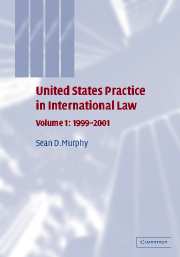Book contents
- Frontmatter
- Contents
- Foreword by Judge Thomas Buergenthal
- Acknowledgments
- Table of Periodical Abbreviations
- Table of Cases
- Table of U.S. Statutes
- Table of Treaties
- I General International and U.S. Foreign Relations Law
- II State Diplomatic and Consular Relations
- III State Jurisdiction and Immunities
- IV State Responsibility and Liability
- V International Organizations
- VI International Law and Nonstate Actors
- VII International Oceans, Environment, Health, and Aviation Law
- VIII International Economic Law
- IX International Human Rights
- X International Criminal Law
- XI Use of Force and Arms Control
- XII Settlement of Disputes
- XIII Private International Law
- Annex
- Index
Foreword by Judge Thomas Buergenthal
Published online by Cambridge University Press: 10 December 2009
- Frontmatter
- Contents
- Foreword by Judge Thomas Buergenthal
- Acknowledgments
- Table of Periodical Abbreviations
- Table of Cases
- Table of U.S. Statutes
- Table of Treaties
- I General International and U.S. Foreign Relations Law
- II State Diplomatic and Consular Relations
- III State Jurisdiction and Immunities
- IV State Responsibility and Liability
- V International Organizations
- VI International Law and Nonstate Actors
- VII International Oceans, Environment, Health, and Aviation Law
- VIII International Economic Law
- IX International Human Rights
- X International Criminal Law
- XI Use of Force and Arms Control
- XII Settlement of Disputes
- XIII Private International Law
- Annex
- Index
Summary
International law practitioners and scholars frequently encounter difficulties in “finding” the factual elements and normative components that serve as the building blocks for the sources of international law. While treaties as an authoritative source of international law present the fewest problems, the same cannot be said of the other two sources. To determine the existence of a customary rule of international law, for example, one must locate relevant state practice, and test that practice against standards of uniformity, consistency, and the requirement of opinio juris. Proof of the existence of a general principle of international law typically requires identifying relevant and comparable principles applicable in the world's major legal systems.
Yet locating such practice and principles can be extraordinarily difficult since there are no means for systematically recording how states and nonstate actors act and react over time in applying or resorting to law in their international relations. Practitioners and scholars consequently have to rely in large measure on national digests or repertoires that compile the relevant international law practice and jurisprudence of individual states. The number of these digests and repertoires is limited because they exist only for relatively few countries. Moreover, their place is increasingly being taken by practice compilations published in international law yearbooks and journals. These tend to be less complete and systematic than the traditional digests, although they are frequently more current.
- Type
- Chapter
- Information
- United States Practice in International Law , pp. xii - xiiiPublisher: Cambridge University PressPrint publication year: 2003
- 2
- Cited by



